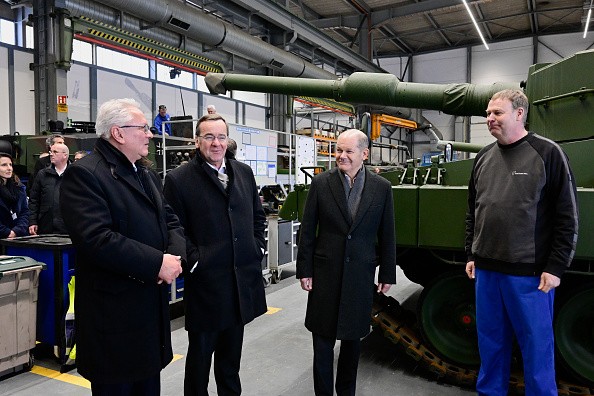German Chancellor Olaf Scholz has called for large-scale production of defense equipment so that Europe could successfully restrain potential aggressors at the groundbreaking ceremony for Rheinmetall's new munitions factory.
Germany has been cautious of its munitions industry and defense forces in recent decades due to its previous military activities.

Scholz pointed to Russia's war on Ukraine and said, "This is urgently necessary because the painful reality is that we do not live in times of peace."
He warned that they must move from manufacturing to mass production of armaments and argued that those who want peace must be able to successfully deter aggressors.
Berlin's post-World War II pacifist views were turned upside down by Russia's invasion of Ukraine in 2022, forcing Berlin to become a proponent of heavy rearmament.
Germany is currently the second-largest supplier of arms to Ukraine, and Scholz has been vocal in his calls for other EU members to contribute more.
What happens in Ukraine will decide "if our peace order, our rules-based world has a future," Scholz said, adding that Russia must "fail with the attempt to swallow its neighbor by force."
The chancellor reaffirmed that armament promises from other EU countries for Ukraine were still insufficient.
The EU established a joint financing mechanism to fulfill Ukraine's armament demand. However, the bloc has struggled to make good on promised deliveries.
Brussels had promised to give Ukraine a million artillery shells by March 2024. But the EU acknowledged last week that it could only produce just over half that by the deadline.
Scholz noted that it was imperative to change course and increase much-needed production capacity after years of underinvestment in the defense sector.
Furthermore, he warned that tanks, howitzers, helicopters, and air defense systems must be lined up on the shelves. He added that if nothing is ordered for years, then nothing is produced.
Read Also : Rwanda Deportation Deal: Parliamentary Report Says Rishi Sunak's Plan is Fundamentally Flawed
Rheinmetall Builds New Ammunition Plant
Rheinmetall's new factory in Unterluess is scheduled to start production in 2025, producing 50,000 shells annually and gradually increasing to its 200,000-shell capability.
Scholz said that thousands of rounds are fired at the Ukrainian frontlines on a daily basis. Furthermore, the German army's weapons store was "rather empty" even before the conflict.
According to Rheinmetall's CEO, Armin Papperger, the new production aims to support Germany's "strategic sovereignty in the large-caliber ammunition domain." The company plans to produce up to 500,000 shells this year, a seven-fold increase over the 70,000 shells it produced annually before the conflict in Ukraine.
Rheinmetall already has a major production facility at Unterluess. It is also where the Puma infantry fighting vehicle and other equipment are manufactured.
According to DPA International, Rheinmetall currently employs 2,500 people at the site.
© 2026 HNGN, All rights reserved. Do not reproduce without permission.








